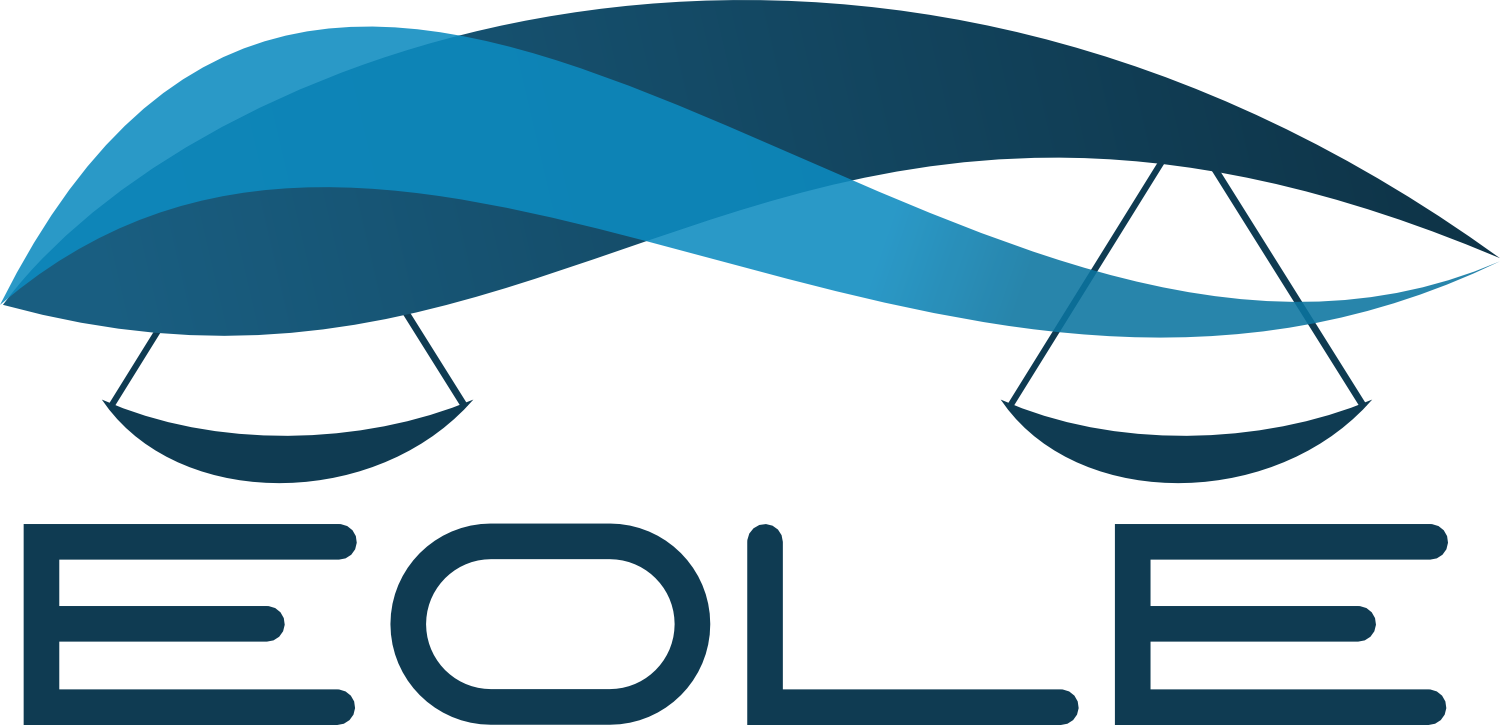EOLE is an annual conference cycle with an international reach, and aims to encourage the pooling and dissemination of legal knowledge relating to open licensing as well as the development and promotion of good practices. An initiative born in 2008 out of the needs of practitioners in the field, EOLE aims to develop a legal doctrine dedicated to open source, with particular attention to the delivery of neutral and quality information. This year, EOLE took place in Marseille on October 16th.
Necessary for some, alternative for others, “digital commons” are becoming the new Eldorado in a society that is sometimes too technological and not human enough. This growing phenomenon is profoundly transforming the practices and uses of many fields: health, mobility, space, etc.
PANEL 2 : Which legal tools for an open collaboration ?
Free and Open Source licenses are a determining element in the success of projects of commons. Their use and their evolution have allowed a wide variety of projects to be structured and to eliminate the legal uncertainties linked to the sharing of resources. This second panel will highlight the success of standard Free and Open Source licenses, but also to discover new contractual forms intended to effectively support emerging digital commons projects.
1/ Building a digital common of public administration through Open Source software: The CSI-Piemonte experience
Laura Garbati, Lawyer, CSI Piemonte
The CSI-Piemonte is an in-house consortium of more than 100 local public administrations based in the Italian region of Piedmont, that, as part of its mission, supports, on behalf of its members, the use of open source as a mean to properly share and enhance the development of software designed for public interest projects. This goal is supported by a political and legal context that has been favorable to its development and growth.
The Regional Law of Piedmont (Piedmont Regional Law 9 / 2009) mentions specifically preference for OS software, and for releasing its own software under a free license. More recently, in 2016, the Code of Digital Public Administration (Legislative Decree 82/2005) has been modified in order to make compulsory for all PA the release of software developed and owned by themselves under a free license on a public repository. Moreover, if an administration intends to acquire IT goods or services, priority is given to Open Source software.
This legal framework is also supported by the guidelines of AGID (the Italian Digital Agency), published on the 9th of May, 2019, which provide good practices for the choice of an Open Source license, and a guidance for making an open source software available on a public repository ; the guidelines also foster coordination and collaboration among public entities.
Supported by this solid basis, the CSI-Piemonte has already been able to release on public repository some projects, such as the « Nivola » cloud platform, a solution that facilitates the use and management of cloud infrastructures and services.
To continue and maintain this momentum, CSI-Piemonte is addressing now new specific challenges, shifting from an« open source by design » model to a « community by design » model. It has been ascertained that mere publication is not enough ;collaboration is needed, before and after publication, in order to achieve an effective advantage for PA as a whole. Other important points on which to focus are also to be aware of the already shared/pooled open sources resources in order to avoid the development of similar projects and to support the communities of developers both downstream and upstream.
Key points :
- The CSI-Piemonte is an in-house consortium of public authorities which is trying to drive its members to a more shared and widespread open source environment
- The existing Italian legal framework already provide an obligation, but government support and collaboration for the project are key factors for its success
- Several workstreams are being carried out to strengthen the project :
- adapt resources to the administrations’ needs,
- start a reflection on the public ownership of projects,
- design and integrate community involvement at each stage of the production of a common
- clearly define which community models to apply and in which context, with the aim to build an open public community of PAs as challenge to address
2/ Maintainers’ contract : An innovative solution to promote the sustainable construction of commons
Camille Moulin, Open Source consultant – inno³
Starting from the fact that currently the majority of proprietary programs contain Open Source software bricks that are maintained by a small community of actors (often unpaid for their work), the Maintainers’ Contract project aims to provide these communities with adequate financial means to ensure the sustainability of the resources produced. The problem of the lack of maintenance of Open Source bricks can indeed be very impactful for all the actors having appropriated the resource. This was for example the case when a security flaw occurred in the OpenSSL open source library, a third party component used by a large number of actors, including banks, and which was maintained by only two people independently.
Faced with this problem, the Maintainers’ Contract is intended to become a standard contract for projects that have already acquired a certain notoriety. Legally, it is based on trademark law, which makes it possible not to encroach on the field of Open Source licenses and to complete the existing model with a new legal and financial arsenal. It works as follows: it is the intermediaries (and not the end users) who directly derive income from the use of the program concerned and who must pay part of this income, about 1%, to the project maintainers for the use of the trademark.
Although the “Maintainers’ contract” project is still in its infancy, it must for the moment face several major challenges in order to prosper. On the side of Open Source projects, it is a question of producing a contract sufficiently readable and accessible so that the maintainers can appropriate it with confidence, as was the case for Open Source licenses. In addition, using a trademark implies registering the project as a trademark, which is likely to be an additional hurdle. Finally, the redistribution of 1% of a project’s royalties for use of the trademark still needs to be accepted by communities and intermediaries who may adopt the Maintainers’ Agreement. Determining the tax base will also be decisive in establishing a relationship of trust between the stakeholders.
Key points :
- Complementary to Open Source licenses, the Maintainers’ Contract draws its strength from trademark law and allows to pay back to Open Source software maintainers a part of the value captured by the market
- The remuneration is paid by the technical intermediaries to the maintainers on the basis of the use of the trademark
- In its maturing phase, the project still faces several challenges: readability, accessibility, standardization, fair pricing and Stakeholders’ acceptance of the tariff (planned for 2020).
3/ The License as a value redistribution tool within digital commons
Vincent Bachelet, Vice-president – Coopcycle
CoopCycle is a European network of bicycle delivery cooperatives. The aim of this network is to enable delivery cooperatives to emancipate themselves from the current delivery platforms that give little or no protection to delivery people and do not allow them to voice their social demands.
The key tool of the deliverers’ liberation project is an independent software platform and mobile application that allows deliverers to organize and schedule their activities. This common resource is developed and maintained by the entire community involved in the project. CoopCycle is currently booming and counts more than twenty cooperatives spread across France and Western Europe. Due to the growing evolution of the project, the federation is now facing new issues.
The first issue is primarily economic. As the association is currently looking for a way to build a sustainable business around the bicycle delivery activity, several avenues of financing are being studied: public financing, pooling of resources, introduction of a membership fee system within the federation, or diversification of the federation’s main activity.
CoopCycle must also deal with a number of organizational and legal issues. For example, the “open” model of the mobile application is the result of a trade-off between the desire to produce a digital common on the basis of an open source license and the expressed desire to defend the interests of a community of independent delivery companies. It is on this basis that the Coopyleft License was born, which juggles between the right of access to the source code of the application on the model of the Affero GPL-3.0 license, and the possibility of commercial reuse restricted only to cooperatives that pay the deliverymen. For the time being, the Coopyleft License has yet to be adopted by all the cooperatives of the federation, which represents a major challenge for CoopCycle, while other legal tools (mutual companies, use of a brand, etc.) are still being studied in order to keep this digital community alive and growing.
Key points :
- CoopCycle is a network of delivery cooperatives whose aim is to provide them with the means to be independent from current delivery platforms.
- The CoopCycle application provides delivery cooperatives with a reliable and independent tool to carry out their deliveries. Its code is open to everyone, its commercial use is reserved to delivery cooperatives.
- The development of the association implies to take into account the financing of the common resource, to promote the use of the Coopyleft License among cooperatives, and to establish an open and efficient governance within the project.
The other articles of this day :
Following this first panel discussion, discover also the other interventions of this day focused on Legal issues of digital commons.
-
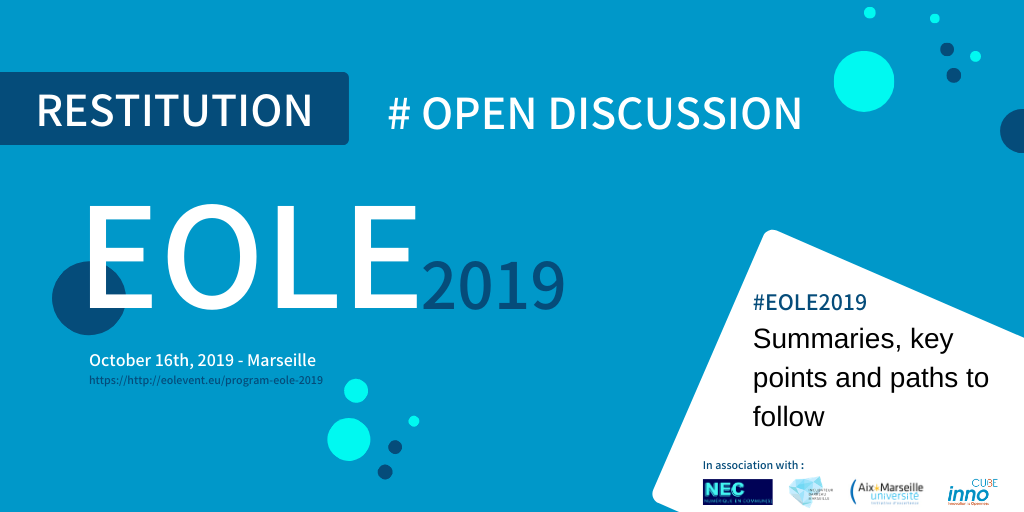
Restitution EOLE 2019 – Open Discussion : Free competition and digital commons
EOLE is an annual conference cycle with an international reach, and aims to encourage the pooling and dissemination of legal knowledge relating to open licensing as well as the development and promotion of good practices. An initiative born in 2008 out of the needs of practitioners in the field, EOLE aims to develop a legal…
-
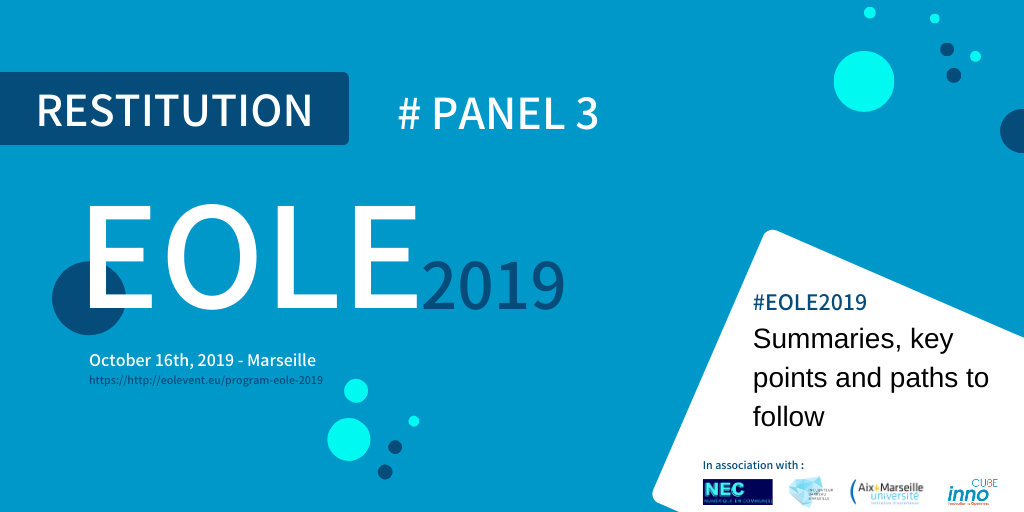
Restitution EOLE 2019 – Panel 3 : Organization and governance of a digital common
EOLE is an annual conference cycle with an international reach, and aims to encourage the pooling and dissemination of legal knowledge relating to open licensing as well as the development and promotion of good practices. An initiative born in 2008 out of the needs of practitioners in the field, EOLE aims to develop a legal…
-
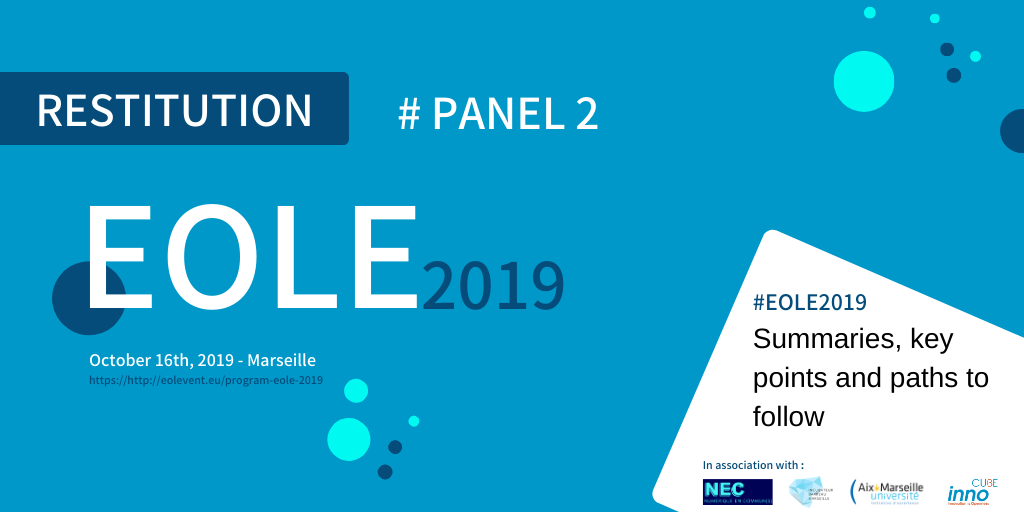
Restitution EOLE 2019 – Panel 2 : Which legal tools for an open collaboration
EOLE is an annual conference cycle with an international reach, and aims to encourage the pooling and dissemination of legal knowledge relating to open licensing as well as the development and promotion of good practices. An initiative born in 2008 out of the needs of practitioners in the field, EOLE aims to develop a legal…
-
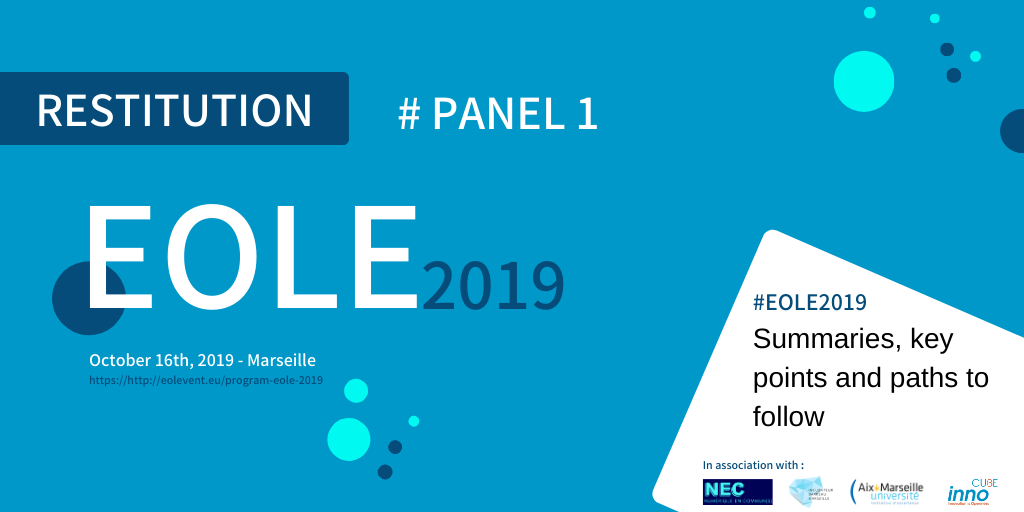
Restitution EOLE 2019 – Panel 1 : Digital commons for everyone
EOLE is an annual conference cycle with an international reach, and aims to encourage the pooling and dissemination of legal knowledge related to open licenses as well as the development and promotion of good practices. Initiative born in 2008 out of the needs of practitioners in the field, EOLE aims to develop a legal doctrine…
